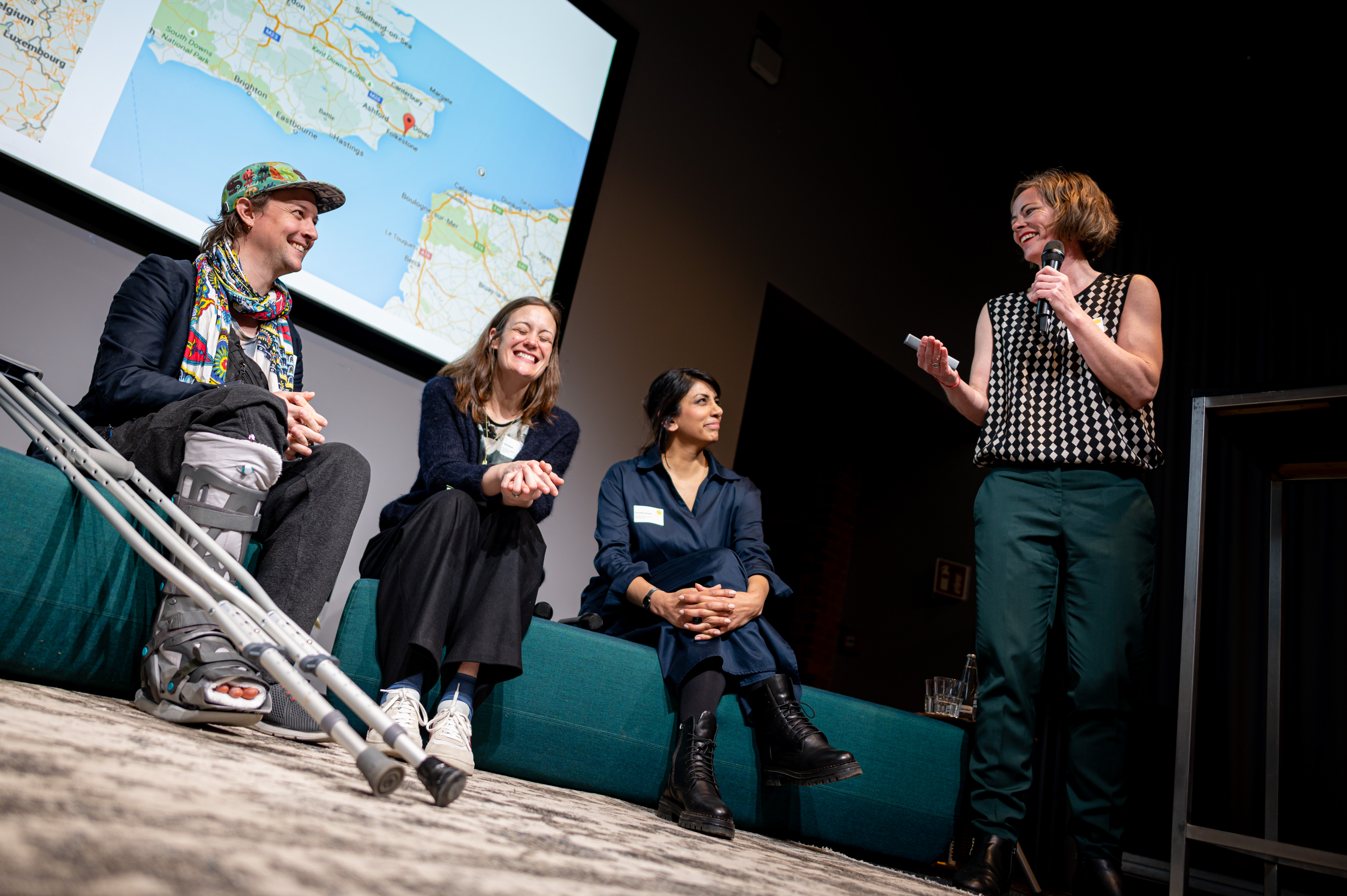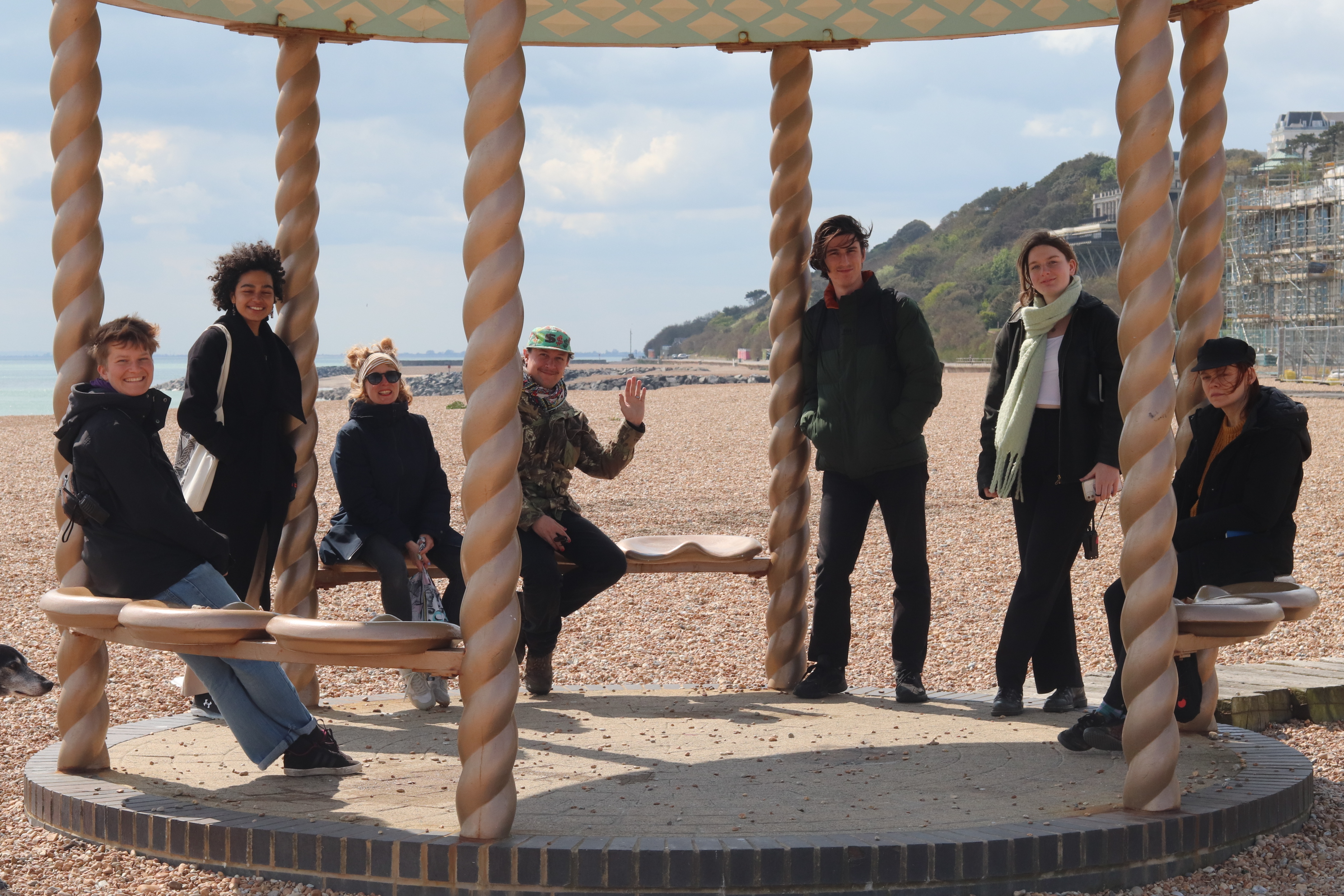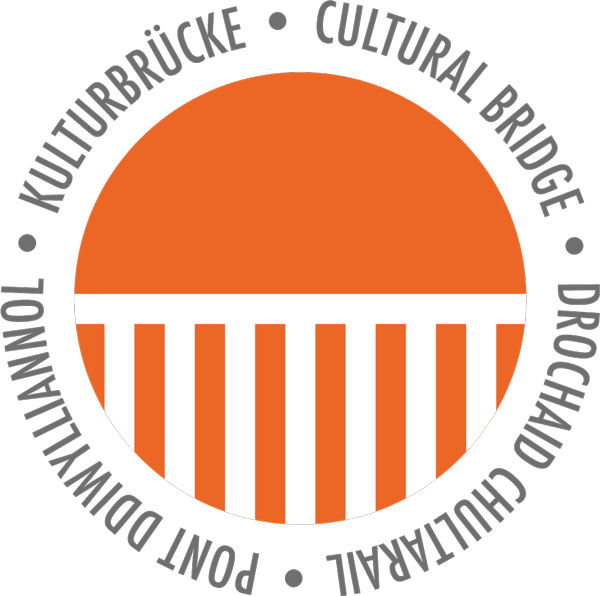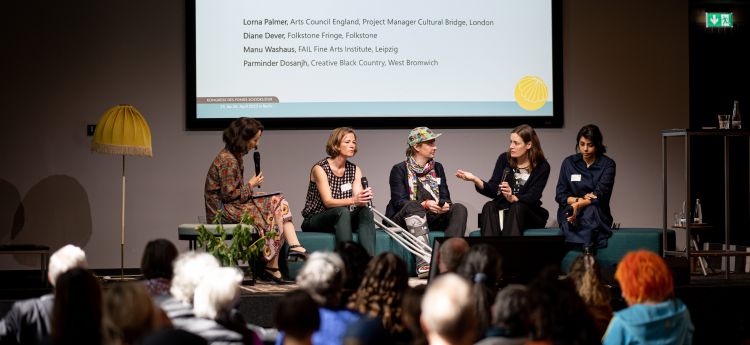In April 2023, Fonds Soziokultur were invited to host the federal congress, Doing Culture. Profiles and Transformation within Social Culture in Berlin, to share insight into the societal and cultural shifts they’ve experienced over the last few years of crisis, with a particular focus on exploring meaningful practice, funding and policy for cultural democracy through projects funded by the German government’s COVID-19 support programme, NEUSTART KULTUR.
The main provocations were:
- In what way can culture and the arts contribute to shaping a just society?
- What kind of funding is needed to contribute to that aim?
- What is good policy for ‘socio culture’ / cultural engagement?
Mechthild Eickhoff, Executive Manager at Fonds Soziokultur and Lorna Palmer, Programme Lead, Cultural Bridge at Arts Council England led a presentation and discussion about Cultural Bridge, alongside representatives from the programme’s stakeholders and funded partnerships.
Following the congress, Mechthild and Lorna have reflected on the experience of sharing Cultural Bridge and hearing about other programmes:
Why was it important to share Cultural Bridge?
Mechthild: From a German perspective, a lot of UK activities in the area of cultural engagement and democracy are super inspirational models. It’s necessary to look abroad for inspiration, to ask and to be asked different questions in a different way which leads to new knowledge. That also was the reason why we tried to find UK-partners for a co-funding model based on our experiences with the Netherlands (“Jonge Kunst”).
The second day of the congress was dedicated to exploring doing things differently and looking internationally. With two hundred practitioners, administrational staff and politicians in the audience, we heard how ‘socio culture’ is practiced and seen from an outer perspective. It is so valuable to reflect on common but also different approaches to cultural democracy, social challenges and the arts . And also to see how a funding scheme can be developed close to practitioners in two countries.
Lorna: As well as it being a wonderful opportunity to finally meet some of the partners in person, having been working virtually with them for over two years, the congress allowed us a moment to share and raise awareness about Cultural Bridge and to reflect on how we are trying to do things differently.
Our presentation focussed on three key areas which feel relatively unique to the Cultural Bridge programme.
Responsiveness in approach
The need for Cultural Bridge was first identified by the co-funding partners in response to funding restrictions due to Brexit, with the UK no longer eligible for Creative Europe or Erasmus, and a shared desire to maintain cultural connections.
The programme launched in September 2021 with a small-scale pilot where being agile and inclusive were both key to ensure new ways of working could be tested and a regular dialogue with funded partnerships maintained, feeding into the development and evolution of the programme.
Multiple funding partners collaborating on a single fund
Cultural Bridge is the first programme that brings all four UK nation’s arts councils together with Fonds Soziokultur, The British Council and Goethe-Institut London, to support intercultural partnerships through one single fund. Monthly stakeholder conversations demonstrate how each funding partner is fully invested in the mission. It has proved that despite each organisation having their own established processes, new and different ways of working together are possible.
What the Cultural Bridge fund enables
With the majority of funds and exchange programmes focusing on specific disciplines, Cultural Bridge’s exploration of socially engaged practice in grassroots organisations offers an opportunity for cross disciplinary learning. Teamed with an integrated and facilitated network that supports growth, new connections and sharing across partnerships, the programme allows for new perspectives and expertise sharing at a greater scale. The fact that there is no expected outcome for new partnerships is vital, allowing space for conversation, experimentation and development of process over product, which is incredibly rare. We are also offering match-making - helping to broker new partnerships between UK and German organisations pre-applications.

Image: Fabian Sommer, Berlin (Fabian Sommer, Freier Fotograf www.fabiansommerfotografie.de)
As part of the congress you invited Parminder Dosanjh (Creative Black Country) and Diane Denver (Folkestone Fringe) who were part of the pilot programme and have since received Tier 2 funding for 2023 - 2024. Can you give insight into some key experiences or learnings that they shared during the discussion?
Mechthild: I always keep in mind the way the staff at Creative Black Country work with their community to build a sustainable culture of ‘culture’. The patience and courage in trying out activities and ways an organisation can do meaningful work is extraordinary, as well as their way of inclusion. The Germans looked very envious on funding schemes such as Arts Council England’s Creative People and Places, with a long-term freedom to develop your organisation.
While Diane from Folkestone Fringe made it crystal clear what artists can mean for a city. They can change it completely into a liveable, vivid and vibrant place. This, in terms of art and culture and wellbeing, but also from an economical perspective. I was impressed by the way both of them, Parminder and Diane were honest about their success and their failures. Passion is one of the keys, courage, patience, imagination and a trustful long-term funding the most needed second one.
Lorna:
There was also much reflection on how quickly meaningful connections have been formed between the Cultural Bridge bilateral partnerships. There’s been a recognition that many of the social issues faced by communities in the UK and Germany were the same, but that Cultural Bridge gave the funded partnerships an opportunity to reflect on and develop their practice in response to those issues. It was also really clear just how valuable having paid time to focus on sharing and developing ways of working with no expected outcome has been.
Having heard from Parminder and Diane at the congress and through other conversations with our funded partnerships, we know that socially engaged practice has human interaction at its core - the human interaction between the practitioners is equally valuable to keep progressing in this field of expertise, with communities ultimately benefiting.


Images from ENTER (year one) and Bridgit 'Building Better Bridges'
Did you come away with new perspectives around the aims of the programme and what it has explored so far?
Mechthild: It was very important to see that building trust plays a key role in the relationships you have in a funding programme. And that’s at all levels, stakeholders and funded organisations. The cultural practitioners have such a rich knowledge about how to develop society through the arts and this cannot be supported enough – with funding and political attention.
Lorna: For me, being in the room in Berlin and hearing from so many practitioners who have been working within their communities, particularly through the pandemic, only reinforced how important this fund and continued funding of social practice is.
The role it has to play in community cohesion, health and wellbeing, in giving communities a voice to respond to challenges, conditions or issues, both local and beyond e.g. climate. It’s crucial.
And that international exchange is absolutely vital in widening all our perspectives!

